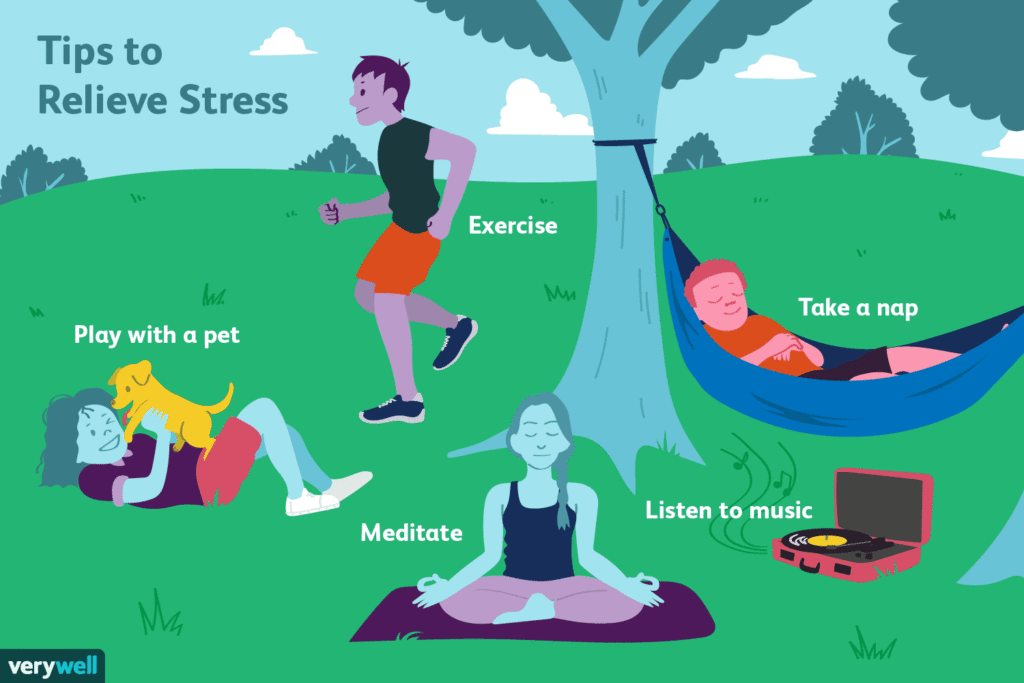10 Proven Ways to Reduce Stress and Improve Mental Health Naturally :-
Stress is an inevitable part of modern life, but chronic stress can take a toll on both your physical and mental health. Whether you’re wondering how to relieve stress quickly, seeking tips tailored to women, or looking for holistic approaches to manage anxiety, there are science-backed strategies that can help you feel calmer, healthier, and more in control. Here are 10 ways to reduce stress and boost your mental well-being-naturally and effectively.
In today’s fast-paced world, stress has become an inevitable part of life. Whether you’re facing pressure at work, challenges in personal relationships, or juggling multiple roles, stress can sneak into your life and affect your mental and physical well-being. The good news? You can manage and reduce stress naturally through simple, effective techniques.
Here are 10 proven ways to reduce stress and improve mental health that are not only backed by research but are also easy to adopt in your daily life.
1. Practice Deep Breathing and Meditation
If you’re wondering how to relieve stress quickly, start with your breath. Deep breathing activates the parasympathetic nervous system, which calms your body’s stress response.
Try This:
Inhale for 4 seconds, hold for 4 seconds, exhale for 4 seconds, and repeat for 5 minutes.
Daily meditation, even for 10 minutes, can reduce anxiety and improve focus.
Great for women, especially during hormonal shifts, breathing helps regulate emotions and brings mental clarity.
2. Engage in Regular Physical Activity
Exercise is a natural stress reliever. It releases endorphins—your brain’s feel-good neurotransmitters—and helps distract you from worries.
Benefits:
- Reduces cortisol (stress hormone)
- Improves sleep and self-esteem
- Effective in relieving stress and anxiety
- You don’t need a gym—walking, yoga, or dancing can be equally effective.
3. Connect with Nature
Nature has a calming effect on the mind. A 20-minute walk in the park or simply sitting under a tree can reduce stress hormones significantly.
Why It Works:
- Increases serotonin
- Lowers blood pressure
- Enhances mood
- Looking for 10 ways to reduce stress? Add “nature time” to your weekly schedule—it’s free and effective.
4. Prioritize Quality Sleep
Lack of sleep amplifies stress, anxiety, and even depressive symptoms. A well-rested mind can tackle life’s challenges with greater resilience.
Quick Sleep Tips:
- Stick to a consistent bedtime routine
- Limit screen time before bed
- Avoid caffeine and alcohol late in the day
- How to relieve stress quickly before bed? Try a warm bath or light stretching to calm your mind.
5. Adopt a Healthy Diet
A balanced diet affects more than just your physical health—it directly impacts mood and brain function.
Foods that Help Reduce Stress:
- Omega-3-rich foods (salmon, walnuts)
- Magnesium-rich greens (spinach, kale)
- Dark chocolate (in moderation)
- Avoid sugar, processed foods, and excessive caffeine—these are known stress triggers.
6. Journaling and Expressive Writing
Writing down your thoughts can declutter your mind and provide emotional clarity. It’s one of the easiest ways to process emotions without judgment.
Start With:
Daily gratitude journaling
Writing 3 things that made you happy
Venting frustrations on paper (and then letting them go)
It’s especially helpful if you’re figuring out how to relieve stress for a woman coping with multiple emotional roles.
7. Limit Social Media and News Consumption
Constant exposure to negative headlines and unrealistic standards on social media can increase stress and anxiety levels.
Detox Tips:
- Limit screen time to 30-60 minutes a day
- Turn off non-essential notifications
- Follow accounts that uplift and educate
- Being mindful of digital content is one of the most modern yet essential ways to reduce stress.
8. Practice Mindfulness and Gratitude
Mindfulness involves focusing on the present moment without judgment. It helps prevent your mind from spiraling into anxiety or regret.
How to Practice:
- Use mindfulness apps (like Calm or Headspace)
- Take 5 mindful minutes before meals or during breaks
- Keep a gratitude journal
- Gratitude is a natural stress buffer. It shifts your focus from problems to positive aspects of life.
9. Build a Supportive Social Circle
Human connection is vital for mental health. Talking to someone who listens can be therapeutic.
Support Strategies:
- Regularly check in with family or friends
- Join support groups or hobby clubs
- Seek professional counseling when needed
- Women, in particular, benefit from emotional bonding—it enhances oxytocin levels, the feel-good hormone that lowers stress.
10. Set Boundaries and Learn to Say No
Many people experience stress from taking on too much. Learning to say “no” without guilt is powerful.
- Boundary-Setting Examples:
- Blocking time for self-care
- Saying no to extra tasks when overwhelmed
- Communicating needs assertively
Understanding your limits is not selfish—it’s how to relieve stress and anxiety before it affects your well-being.
Related posts:
 How to Lose Weight Fast Naturally and Permanently ?
How to Lose Weight Fast Naturally and Permanently ?
 Top 7 Foods to Lower High Blood Pressure and Boost Heart Health Naturally
Top 7 Foods to Lower High Blood Pressure and Boost Heart Health Naturally
 What to Eat to Lower Blood Sugar Immediately: A Quick Guide
What to Eat to Lower Blood Sugar Immediately: A Quick Guide
 What Is Contoura Vision Eye Surgery?
What Is Contoura Vision Eye Surgery?
 Generic Lyrica 150mg: Relief for Nerve Pain and Anxiety Explained
Generic Lyrica 150mg: Relief for Nerve Pain and Anxiety Explained
 Unlocking Adult ADHD Diagnosis in New York: The Impact of Gene Site Testing and Comprehensive Assessments
Unlocking Adult ADHD Diagnosis in New York: The Impact of Gene Site Testing and Comprehensive Assessments
 Oxazepam 50 Mg Kaufen: Können Sie Oxazepam 50 mg ohne Rezept kaufen?
Oxazepam 50 Mg Kaufen: Können Sie Oxazepam 50 mg ohne Rezept kaufen?
 The Best Way To Maintain An Erection Without Pills……….
The Best Way To Maintain An Erection Without Pills……….







